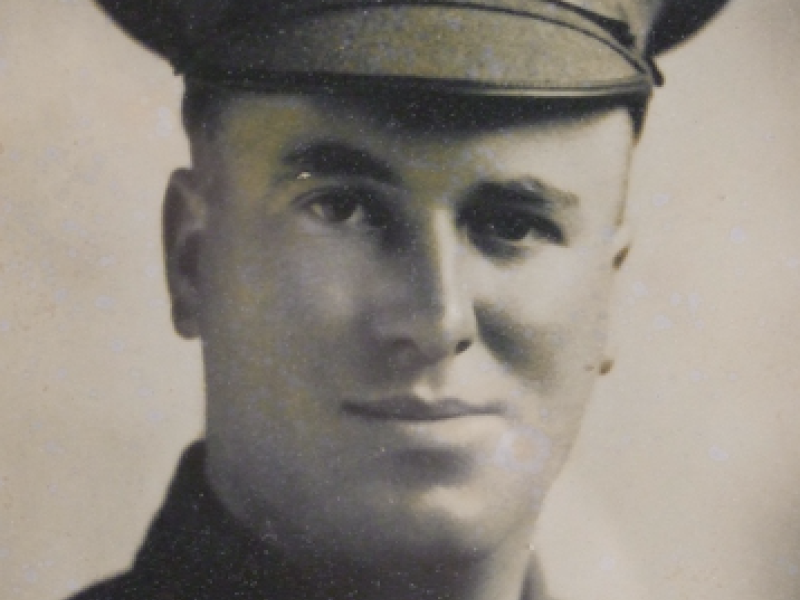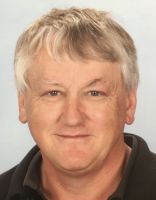Allan Dixie Findlay
Allan Dixie Findlay was born on the 17th of April, 1915, at Corryong, Victoria. He was the eldest of four children of Allan Kirkham and Mabel Bertha (nee Waters) Findlay. Allan’s younger sister, Leslie Jean, died in 1928 at the age of 9. Allan also had two younger brothers, Douglas Haig Findlay born one year after him, and Geoffrey, born in 1922. Allan’s father, Allan senior, was the commission agent at Colac Colac from 1916.
In 1936, Allan attended the Melbourne Teachers College, in Carlton, and trained to become a teacher. The MTC annual of that year, The Trainee, mentioned that “Mr Dick Findlay, as goal umpire, got soaked many times for a good cause. Thanks Dick for such enthusiasm.” Between 1937 and 1939 he was a teacher at Mount Alfred whilst he is listed as a teacher at Mudgegonga in 1942, even though by this time he had been enlisted in the Army since 1940.
Sometime after June of 1940, Allan married Kathleen Patricia Curran, a 17 year-old from the Dandenongs. In February of that year, Kathleen had been made an Associate of the London College of Music (Elocution).
Allan enlisted on the 18th of June, 1940, at Caulfield, Victoria, although his medical was done at Myrtleford by a Dr Beaumont, and was allocated the service number VX42379. Allan’s initial training was undertaken at Camp Balcombe on the Mornington Peninsula. On the 5th of February, 1941, he embarked on HMT MX3 at Port Melbourne, arriving in the Middle East sometime later.
Here, he was taken on strength with the 21st Australian Infantry Training Battalion of the 7th Australian Division. This Division, along with the 6th and 9th, were the only Australian Divisions to fight in both the Middle East and Pacific Campaigns. Allan was promoted to acting Lance Corporal and, in April of 1941, transferred to the 7th Division Petrol Company based at Hill 95 Camp in Palestine.
During the Syrian Campaign, Allan was detached to the Cyprus Regiment, Mediterranean Expeditionary Force. Part of this force's duties included the transportation of equipment using mules, in areas that were too hilly for wheeled vehicles. During the three months that Allan was attached to this unit he was promoted to Lance Corporal.
In January of 1942, Allan was transferred to No 4 Company AASC (Australian Army Service Corp). At this stage it was decided that the 6th and 7th Divisions were required back in Australia as the situation in the Pacific deteriorated even further. Allan embarked on the Ile de France only to be transferred to the Eastern Prince at Bombay, India on the 8th of February. He finally disembarked in Australia on the 24th of March.
In late April he was granted an eight day leave of absence, although it is not known what he did during that time. On the 25th of July he was promoted to acting Corporal of the 2/4 AASC.
On the 23rd November, 1942, the 2/4th AASC landed at Popondetta with troops, supplies and ammunition. A Captain Newton and 16 other ranks, including Allan, reported at Soputa from Kokoda for duty.The company had brought along 4 25 pounder guns and 8 jeeps. Seven jeeps were taken over by company drivers. The jeeps were used to maintain ammunition to the 25 pounders and to carry other supplies. These vehicles were running consistently, and the shortage of drivers made 24 hour service difficult.
The War diary of the 2/4th recorded on the 27th November, 1942 the following;
“Ilolo - air raid on Division Headquarters, American CCS (American Casualty Clearing Station), Soputa area (eastern coastal plains of New Guinea - 13 km west of Buna) TX2455 Dr Jones, CH killed instantly, Corporal Findlay seriously wounded. Captain T.M. Newton slightly wounded. All died the next day. The deaths of Dr Jones and Corporal Findlay marked the first fatal casualties by enemy action for the company.”
Allan is remembered on the Australian War Memorial Roll of Honour, and the Corryong War Memorial. For his service, he was awarded the 1939-1945 Star, the Africa Star, the Pacific Star, the Defence Medal, the War Medal 1939-1945 and the Australian Service Medal 1939-1945.

 Stephen Learmonth
Stephen Learmonth